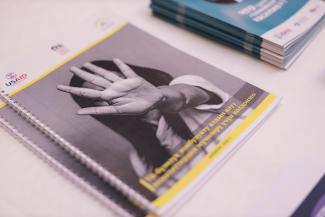The important results that civil society organization-government partnerships have achieved in the Kyrgyz Republic in the field of combating domestic violence were discussed today at a conference in Bishkek, which marked the completion of USAID-funded Jigerduu Jarandar project’s Covid-19 rapid response grants program.
Thanks to this emergency initiative, more than 2,500 survivors of domestic and gender-based violence received social, legal and psychological support from eleven civil society organizations (CSOs) funded by the Jigerduu Jarandar project.
In response to the rise in domestic violence across the Kyrgyz Republic during COVID-19-related lockdowns, the CSOs worked across the country to provide shelter services, hygienic kits, food packages, monetary assistance, and mental health counseling to violence survivors and those in vulnerable households (DIA, Women Support Center, Kaniet, Abiyir El, Nurjolber, Activist, and Ayalzat).
The CSOs have also conducted information and public education campaigns on violence prevention both on the national and local level (Open Line, Activist, Nurjolber, Abiyir El, Kaniet, Ayalzat), trained lawyers of free legal aid centers working under the KR Ministry of Justice on providing legal aid to violence survivors (Kyrgyz Association of Women Judges), and worked on improving cooperation between government agencies responsible for violence prevention (League of Defenders of Children’s Rights).
During his remarks during the event, USAID Democracy and Governance Office Director Noel Bauer, emphasized the importance of continuing concerted efforts to promote gender equality to prevent violence against women. “Reduction of gender-based and domestic violence requires long-term, coordinated and systematic action of the Government and the civil society. And USAID is always ready to support these coordinated efforts” said Mr. Bauer.
An important achievement of this grants program is the establishment of 17 new Local Committees on the Prevention of Domestic Violence (LCPDVs) and strengthening of existing 84. These committees comprised of local leaders and civil society were initiated by the Kyrgyz government. As the network of such committees is expanding, the Jigerduu Jarandar Project supported improving cooperation between local self-governments (LSGs) and LCPDVs.
“LCPDVs have proven to be a working mechanism for supporting citizens who suffered from domestic violence” said Aliza Soltonbekova, Deputy Minister of Health and Social Development of the Kyrgyz Republic in her opening remarks. She stressed that effectiveness of such violence prevention tools depend on cooperation between government and civil society. “The new National Strategy of Gender Equality until 2030 and the National Action Plan for 2021-2023, currently being developed, will reflect the measures we and our civil society partners will undertake to reduce gender-based violence in Kyrgyzstan.”
During the event, representatives of the eleven CSOs discussed and shared interesting cases and practices, accomplishments and challenges faced during the implementation of their respective grant projects. Following the presentation of the LCPDV monitoring findings by Jigerduu Jarandar Project, the event’s participants took part in a panel discussion on ways to improve government-civil society interaction in combating gender-based and domestic violence in the Kyrgyz Republic.

